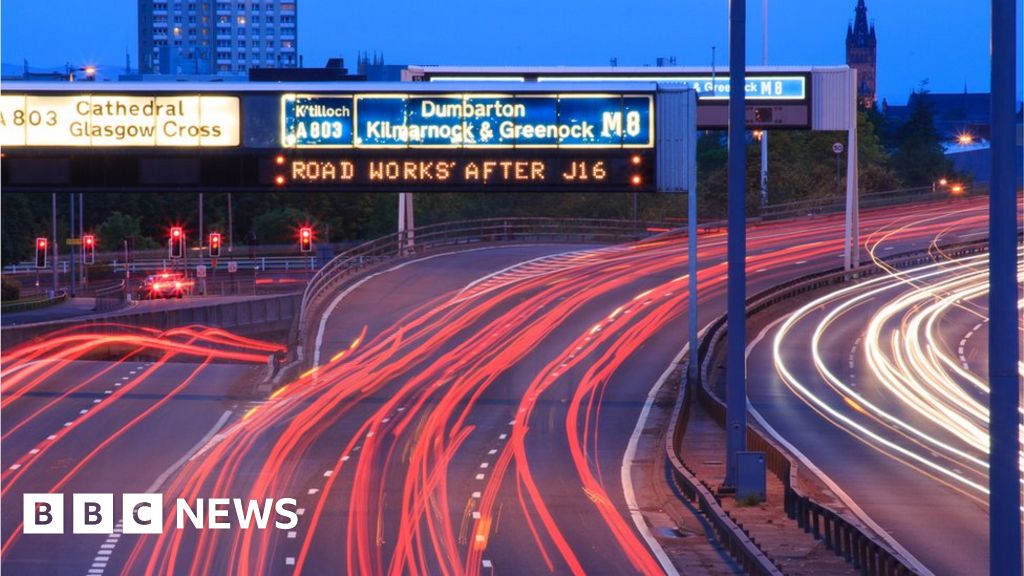
Glasgow and Edinburgh are going head-to-head to try to become the UK's first "net zero" city.
Both cities have now unveiled ambitious plans to cut greenhouse emissions to a neutral level.
Glasgow wants to reach the target "well before" 2045, while Edinburgh has set its target to 2030.
Scottish Power is helping Glasgow with its aims and says a "race to zero" is exactly what is needed to effect a significant change.
The company believes if inner cities can achieve the goal, then any location can.
Both bids exceed the Scotland-wide 2045 ambition announced by the Scottish government earlier this month.
Glasgow's plans include mass charging points for electric vehicles.
Glasgow City Council and Scottish Power say they will work on a range of programmes to help the city reach the target, including the power giant investing in electric buses.
Edinburgh's initiative will concentrate on local supply chains being redeveloped for "construction and refurbishment in low carbon design".
A "circular economy" could be created - focusing on local production, low waste and increased recycling. More renewable energy will be generated locally.
Net-zero is the point where the same volume of greenhouse gases is being emitted as is being absorbed through offsetting techniques like forestry.
Scottish Power chief executive Keith Anderson says Scotland was right to put itself at the front of the race to become net-zero.
Speaking on BBC's Good Morning Scotland programme, he said: "If this declaration kick starts a race to zero with other ambitious cities, like Edinburgh, because then we will all be winners.
"The prize is the future of our country and our planet.
"For Scotland to get to net carbon zero by 2045 the cities have to get there first. Edinburgh has announced plans to be more ambitious and we are working very closely with Glasgow council, so let's have some competition.
"A 'race to zero' is a good thing. It is a healthy thing and will create a better environment, cleaner air, so let's go on and start the race."
Climate emergency
The move came after Nicola Sturgeon declared a "climate emergency" at the SNP party conference last month.
A week later the Scottish government said it would legislate to reduce greenhouse emissions to net-zero by 2045.
Advice from the Committee on Climate Change urged Scotland to set the target five years ahead of the UK as a whole because of its potential for planting trees.
Scottish Power said renewable energy capacity had to quadruple and electricity generation needed to double before Scotland could meet the target.
What does net-zero mean?
The terms carbon neutral and net-zero are often used interchangeably but there are differences.
Carbon dioxide (CO2) is the most abundant greenhouse gas but there are others which the Scottish government counts and they are not all carbon-based.
Therefore, some climate change campaigners prefer the term net-zero as it includes not just CO2 and methane but also nitrous oxide, which is emitted during agricultural and industrial activities as well as from fossil fuels.
Simply being carbon neutral would not stop global warming because these other gases are also harmful to the atmosphere.
Perhaps an even better term would be "climate neutral".
Glasgow's plan
Glasgow was the location of Scotland's first low emission zone (LEZ), which intends to phase out the dirtiest buses from the city centre over five years.
The UK's largest onshore wind farm, Whitelee, which is owned by Scottish Power, is on the outskirts of the city.
The focus is now expected to turn to other parts of the city's economy that can be decarbonised, such as transport and heating.
Among the issues they are expected to tackle is that of electric vehicle charging.
More than 70% of the city's residents living in flats are unable to charge electric cars as they have no off-street parking.
Scottish Power says it is planning a charging system where people can rapidly charge their vehicles away from home - at work or at public charging locations.
Sites for these locations are being assessed and the scheme could become a template for other UK cities facing similar problems.
Glasgow City Council leader Susan Aitken said: "We simply have to act now and the Glasgow city government will develop those partnerships necessary to get to where we simply have to be. We need to be a net-zero city. And we need to be the UK's first net-zero city."
Edinburgh's mission
Council heads in the capital have set one of the most ambitious targets globally - 15 years earlier than the Scottish government's ambition.
The council says it faces "tough choices" including replacing conventional gas boilers in properties with carbon neutral alternatives.
It will also become more difficult to access the city centre by car with priority given to cyclists, pedestrians and those using public transport.
Freight hubs could also be set up outside the city - allowing for low carbon alternatives to bring goods into the Capital.
There will be an increase in council and city generation of renewable energy including the "use of council land and property for micro-generation, support local groups to develop renewables projects and encourage innovation in adopting new technologies".
Waste services are also set for an overhaul. The council hopes to develop a new "energy recovery facility" to manage non-recyclable waste.
Council leader Adam McVey said: "We are quite clear the 2030 target should be the target for this organisation and this city - but with a hard limit of 2037.
"I think it's important that this organisation responds to the challenges we all recognise they are incredibly serious. I think it's important that we as a city take our responsibility seriously."
https://www.bbc.com/news/uk-scotland-48269986
2019-05-15 10:30:00Z
CBMiLWh0dHBzOi8vd3d3LmJiYy5jb20vbmV3cy91ay1zY290bGFuZC00ODI2OTk4NtIBMWh0dHBzOi8vd3d3LmJiYy5jb20vbmV3cy9hbXAvdWstc2NvdGxhbmQtNDgyNjk5ODY
Tidak ada komentar:
Posting Komentar